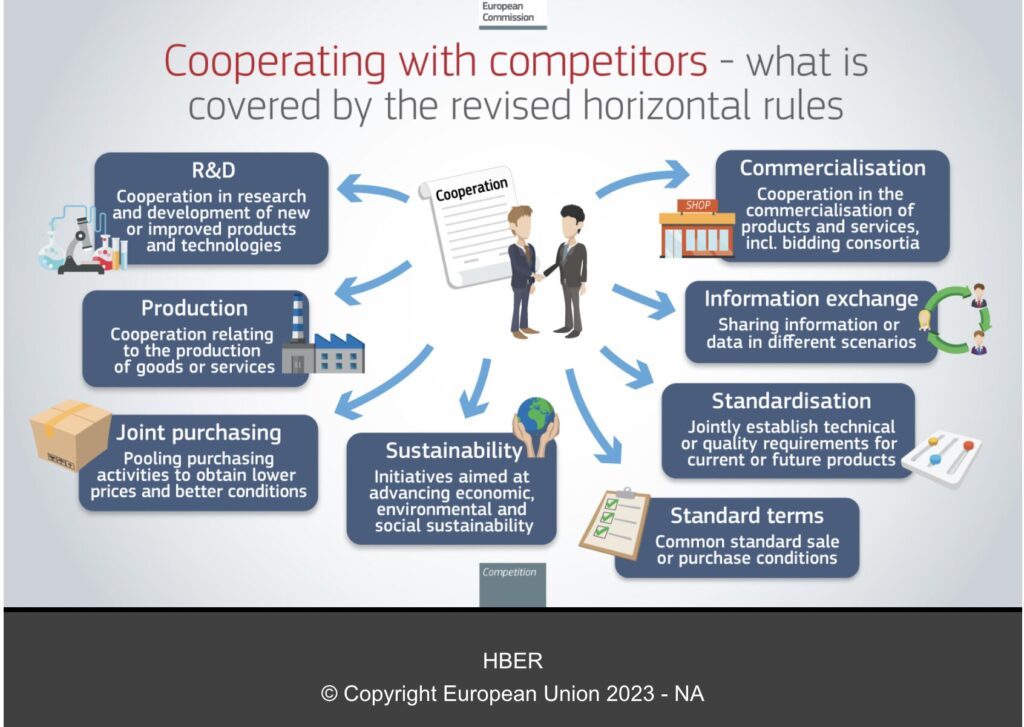The revised rules expand the scope of the exemption regulation covering more areas and providing clarifications about when two or more competitors can collaborate without violating EU rules.
Importance of the Horizontal Block Exemption Regulations (HBERs)
Under Article 101(1) of the Treaty on the Functioning of the European Union (TFEU), agreements that restrict competition are prohibited. However, the HBERs provide a safe harbor for R&D and specialisation agreements that meet specific conditions, ensuring their compatibility with the single market. The Horizontal Guidelines complement the HBERs by offering guidance on various other cooperation agreements between competing companies.

The European Commission adopted on June 1 the revised Horizontal Block Exemption Regulations on Research and Development (R&D) and Specialisation agreements (HBERs), accompanied by revised Horizontal Guidelines. The revised HBERs and Guidelines offer businesses clearer and up-to-date guidance to assess the compatibility of their horizontal cooperation agreements with EU competition rules. The new regulations will come into effect on July 1, 2023, while the Guidelines will be published in the Official Journal of the EU.
Key Changes in the Revised Rules:
- Expansion of the Specialisation Block Exemption Regulation to cover a broader range of production agreements involving more than two parties. The revised rules introduce a more flexible approach for the calculation of the market shares for the purpose of applying the block exemption
- New guidance on the application of Article 101 TFEU to agreements between joint ventures and their parent companies, as well as expanded guidance on how to apply the Guidelines to agreements that involve cooperation on more than one type of activity (e.g., production and commercialisation
- Improved clarity and flexibility in calculating market shares for the R&D Block Exemption Regulation, with an emphasis on protecting innovation competition.
- Updates in the Guidelines, incorporating the latest case law on concepts such as concerted practices, potential competition, and ancillary restraints.
- Inclusion of a section on Mobile Telecommunications Infrastructure Sharing Agreements in the Guidelines’ chapter on Production Agreements.
- Expanded and clarified guidance on Purchasing Agreements, Commercialisation Agreements, Information Exchange, and Standardisation Agreements. he revised chapter explains the distinction between joint purchasing and buyer cartels. It also clarifies that joint purchasing extends to arrangements whereby buyers negotiate purchase conditions jointly, but each buyer makes its purchases independently. It also gives more prominence to possible anti-competitive effects on the upstream supply side and provides guidance on certain joint negotiating tactics, including the use of temporary order stops.
- Introduction of a new chapter on Sustainability Agreements, clarifying that antitrust rules do not hinder sustainability-driven agreements between competitors.
- Restructure and expand the chapter of the Guidelines on Information Exchange to reflect the latest case law and enforcement experience. The revised chapter includes additional guidance on: (i) the concept of commercially sensitive information; (ii) the types of information exchange that may constitute restrictions of competition by object; (iii) potential pro-competitive effects of data pools; (iv) indirect forms of information exchange, including hub-and-spoke arrangements; (v) anti-competitive signalling via public announcements; and (vi) practical measures that companies can take to avoid infringements, such as limiting the scope of the exchange, using clean teams or independent trustees and public distancing.
“The revised rules on horizontal agreements provide clear guidance to help businesses assess the compatibility of their cooperation agreements with our competition rules. Including joint sustainability initiatives. This up-to-date guidance is a key tool to push forward the green and digital transitions”. Margrethe Vestager, Executive Vice-President in charge of competition policy

